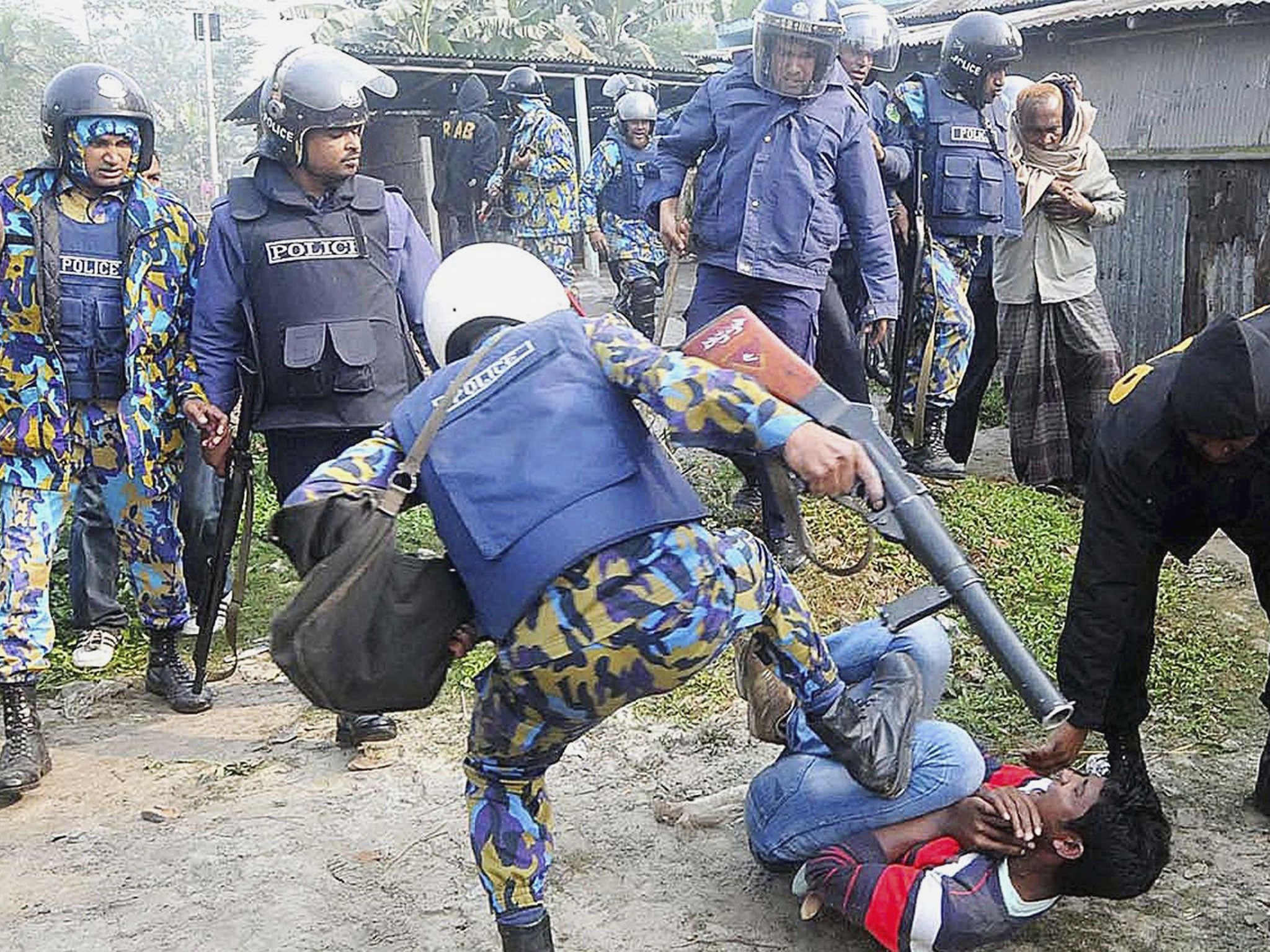Bangladesh: Ruling Awami League wins election marred by boycott and violence
Chaos surrounding poll plunges nation deeper into turmoil and could lead to more violence in the deeply impoverished country of 160 million

Your support helps us to tell the story
From reproductive rights to climate change to Big Tech, The Independent is on the ground when the story is developing. Whether it's investigating the financials of Elon Musk's pro-Trump PAC or producing our latest documentary, 'The A Word', which shines a light on the American women fighting for reproductive rights, we know how important it is to parse out the facts from the messaging.
At such a critical moment in US history, we need reporters on the ground. Your donation allows us to keep sending journalists to speak to both sides of the story.
The Independent is trusted by Americans across the entire political spectrum. And unlike many other quality news outlets, we choose not to lock Americans out of our reporting and analysis with paywalls. We believe quality journalism should be available to everyone, paid for by those who can afford it.
Your support makes all the difference.Bangladesh's ruling party has won one of the most violent elections in the country's history, marred by street fighting, low turnout and a boycott by the opposition which made the result a foregone conclusion.
Although a win by the ruling Awami League was never in doubt, the chaos surrounding Sunday's poll plunges Bangladesh deeper into turmoil and economic stagnation, and could lead to more violence in the deeply impoverished country of 160 million.
Today, clashes stemming from the election killed three people in Dohar, outside the capital, according to police. At least 18 people were killed yesterday as offices fired at protesters and opposition activists torched more than 100 polling stations.
"We are passing our days in fear and anxiety," said Abdur Rahman, an accountant and resident of the capital, Dhaka, where soldiers patrolled the streets today. "These two major parties don't care about anything. Only Allah knows what is in store now for us."
The Awami League won 232 of the 300 elected seats, the Election Commission said today, far more than 151 required to form a government. Because of the opposition boycott, about half the seats were uncontested, allowing the Awami League to rack up many victories.
Political feuding in the South Asian nation can be traced back decades, as Prime Minister Sheikh Hasina and opposition leader Khaleda Zia vie for power. The country has been ruled by either of the women - both from powerful political families - for nearly 22 years.
The squabbling between the two - known as the "Battling Begums" - is at the heart of much of the political drama. "Begum" is an honorific for Muslim women of rank.
The opposition has demanded that Ms Hasina's government resign so a neutral administration can oversee the polls. They say Ms Hasina might rig the election if she stays in office, a claim she denies.
A group of opposition parties, including the main opposition Bangladesh Nationalist Party, boycotted the election after Ms Hasina refused to heed their demands. Political violence has convulsed the country in recent months as opposition activists staged attacks, strikes and transportation blockades to press their demands. Nearly 300 people have been killed in political violence since last February.
The European Union, the US and the British Commonwealth refused to send observers for yesterday's polls because they were not inclusive.
Now, the vote raises pressure on the Bangladesh government to hold talks with the opposition. The turmoil could also lead to radicalisation in a strategic pocket of South Asia, analysts say.
Turnout was only 22%, according to election officials who asked that their names not be used because the election is so politically sensitive. In the last election, in 2008, turnout was 87%.
Dhaka's Daily Star newspaper described the polls as the deadliest in the country's history, and said in an editorial that the Awami League won "a predictable and hollow victory, which gives it neither a mandate nor an ethical standing to govern effectively".
But the editorial was also critical of the opposition's role in fuelling violence.
"Political parties have the right to boycott elections. They also have the right to motivate people to side with their position. But what is unacceptable is using violence and intimidation to thwart an election," the newspaper said.
Bangladesh's parliament has 350 seats, with 300 directly elected and another 50 reserved for women who get elected by other chamber members.
As the political situation unravels, Bangladesh is also trying to emerge from suffocating poverty and reinvigorate its 20 billion US dollars garment industry, which has been rocked by a series of disasters, including a factory collapse in April that killed more than 1,100 workers. The deaths laid bare the harsh working conditions in an industry that employs 4 million Bangladeshis and provides clothing to major Western retailers.
Read more:
At least 21 dead as violence surrounds controversial election
AP
Join our commenting forum
Join thought-provoking conversations, follow other Independent readers and see their replies
Comments